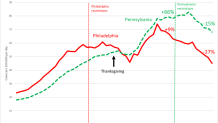What to Know
- Philadelphia's coronavirus-related restrictions on indoor dining will remain until Jan. 15, a 2-week extension of the original end date.
- Some less-risky activities like museums and outdoor sports could resume Jan. 4, when state restrictions end.
- The city's top health official is worried about case spikes and virus spread related to the Christmas and New Year's holidays.
Philadelphia leaders pushed back the expiration date of coronavirus restrictions for another two weeks Tuesday, saying holiday case spikes would likely create more stress on the city's hospitals.
The city halted indoor dining and closed gyms and museums before Thanksgiving, which Health Commissioner Dr. Thomas Farley said helped lessen a spike in cases after family gatherings on the holiday. The restrictions were set to expire Jan. 1.
Now, the end date is Jan. 15, though some activities could resume sooner depending on how severe the Christmas and New Year's spikes are.
Get Philly local news, weather forecasts, sports and entertainment stories to your inbox. Sign up for NBC Philadelphia newsletters.
Only the riskiest activities - like indoor dining - are definitely halted until the 15th. Lower risk activities like museums, outdoor sports, gyms and in-person learning could resume Jan. 4.
Pennsylvania leaders implemented similar restrictions weeks after Philly did. Those expire Jan. 4.
Farley said the city was announcing the extension Tuesday to give businesses time to prepare.
What is happening now?
The ban on these activities is definitely extended to Jan. 15:
- Indoor dining
- Indoor gatherings and events
- Theaters
- Casinos
- In-person instruction for colleges
- Indoor organized sports
The ban on these could potentially end Jan. 4, depending on case counts. Otherwise, it would continue to Jan. 15 like the rest:
- Museums
- Outdoor sports
- Gyms
- In-person instruction for high schools
- Outdoor catered events
Extending the restrictions comes as the health department grows concerned about post-holiday spikes in case counts.
"We'll begin to see the effect of Christmas in the last few days of December and we'll begin to see the effect of New Year's on about Jan. 5," Farley said. "These two spikes will likely run together, and unfortunately, may feed off each other. We won't likely see the end of them until about Jan. 15."
Pennsylvania's restrictions currently expire Jan. 4, which would allow some of the affected industries to reopen statewide unless local action were taken.
"We believe it's too risky to end either of our [city or state] restrictions on either Jan. 1 or Jan. 4. We need to get past that spike before it's safe to back off," Farley said.
Restrictions and cases
Data modeling says undoing all restrictions in Pennsylvania right now could result in as many as 9,000 additional virus deaths by April 1, Farley said. The proportion of those in Philadelphia could be as high as 800, he estimated.
A chart that showed case counts in the city and state since Nov. 1 (at 17:10 in this video) showed a flatter curve in Philly than in Pennsylvania for a few weeks.
"Our case rates started to fall after [Thanksgiving]. ... After 5 days, about one incubation period later, there was a big increase both in Philadelphia and in Pennsylvania as a whole. After that surge passed, case rates started to fall in Philadelphia, but not so much in Pennsylvania. During this period when we had restrictions in Philadelphia but not Pennsylvania as a whole, overall case rates rose 9% in Philadelphia but 66% in the state as a whole."

Rates fell in both the city and state after Pennsylvania put its restrictions in place.
A handout given to news outlets explains part of why some activities like indoor events are restricted.
"These activities continue to be considered higher risk because they take place indoors and involve a large number of people, people spending long periods of time together, people not wearing masks, and/or they’ve had previous large outbreaks due to not following social distance guidelines."
Vaccinations
If current estimates hold, Philadelphia will have received 130,000 doses of vaccines against the coronavirus by mid January, a mix of the Pfizer and Moderna products, Farley said.
The city would then move to Phase 1B, where about 100,000 elderly people would receive their doses, along with 157,000 frontline essential workers.
Farley said we will be in Phase 1A until mid-January, but "Phase 1B is a very large group."
It's too early to say how soon Phase 1 could end, since the city doesn't have shipment schedules for the vaccine doses beyond four weeks from now. The city still needs to hear how many doses it will get in future months.
Farley said this is still a high-risk period for contracting the virus and urged residents to celebrate with their immediate household and not travel for Christmas and New Year's.
"We can't afford to have more case spikes like that Thanksgiving spike. Don't travel over the holidays...it doesn't matter if you've been tested and they've been tested."

